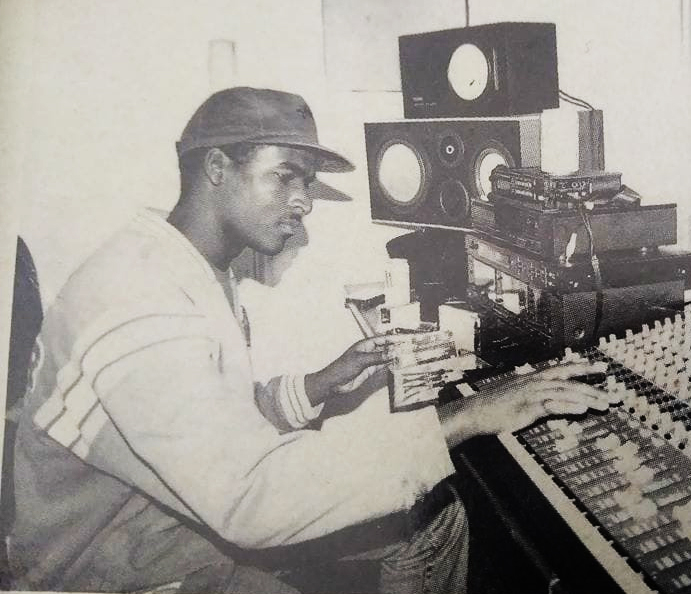Last week saw the publication of an article I’ve been waiting to share for some time. It concerns someone whose contributions to a number of pioneering early UK “bleep and bass” techno records has largely gone undocumented: Martin Williams AKA DJ Martin.
The feature is called “The Mentor: The Untold Story of DJ Martin” and you can read it now on Red Bull Music Academy Daily. It’s an extraordinary tale in many ways, but not necessarily for the reasons you’d expect. Of course, Martin’s role as an unsung producer and studio engineer in the late ‘80s and early ‘90s is discussed, as his more recent career as a trainer of professional boxers. What it’s really about, though, is his ability to change lives through helping, inspiring or mentoring others, something he’s been doing since the mid 1980s. It’s this that makes Martin’s story worth sharing, even if he feels uncomfortable about all the attention (but I’ll come on to that a bit later).
Quite why Martin’s role in the formative stages of the bleep and bass revolution has remained a secret – at least to all bar those who knew him in those days – is something I can’t explain. The fact that he was never really bothered about getting credits on records and preferred being “behind the scenes” probably has something to do with it. He is credited as a songwriter on his most famous co-production, LFO’s peerless “LFO”, but by all accounts he was told to fight for that by those around him in Chapeltown, the Leeds neighbourhood in which he lived. While LFO’s Gez Varley has gone on record a number of times to say how important Martin was – and to confirm that, yes, Martin was a member of the group (he may even have come up with the band name according to a couple of my interviewees) – his then production partner, the late Mark Bell, went on record a number of times saying the exact opposite.
A number of interviewees in Leeds and Sheffield have told me that they think Martin was treated badly by Warp Records and the other members of LFO, who for whatever reason decided to move forwards without him. The man himself will have none of it, though. If he was “screwed over” (as Robert Gordon put it when I interviewed him last summer), Martin bears no grudges and harbours no regrets – as he says in the feature, it didn’t bother him as he’d already begun working with other people.
This is fully in keeping with the character of the man I’ve got to know over the past 18 months. Martin is a hugely positive person who prefers to look on the bright side of life – a genuine “glass half full” kind of guy. He’s told me on numerous occasions that he has a short attention span, something that explains his multiple changes of career and keenness to work on different projects. He’s also warm, funny, generous with his time, a self-proclaimed “problem solver” and someone who will go out of his way to help others.
How Martin has helped others to turn their lives around or simply get things done is the thread that links his musical past with his boxing present. All those I interviewed for the feature were more than happy to share stories – some truly remarkable – about how Martin made their lives better, inspired them or did something out of the ordinary for them. His current boxer, Sam Smith, was not only full of praise for him, but also seemed to be a bit protective. She told me that Martin doesn’t realise how much he does for others and that she worries that people will take advantage of his good nature. It’s certainly true that he’s had his fingers burnt in this way before, but when you get him on the subject he simply shrugs his shoulders. This is what I admire about him the most, I think.
One of the things that struck me while reflecting on his story was just how many of those he helped or inspired have gone on to do similar things. Sam Smith, for example, is passionate about changing the lives of youngsters through boxing. She set up a community-focused boxing gym with her business partner for this very purpose. Paul Edmeade, who first got to know Martin when he was a teenager in the mid 1980s, now devotes his time to teaching music production and DJ skills at a community studio and audio engineering school. It’s as if they’ve tried – subconsciously or otherwise – to follow in his footsteps (or at least learn from his example).
Martin will be very uncomfortable if he reads this, because he genuinely doesn’t like the limelight. He did say that he got emotional reading the article because he genuinely didn’t realize how much his help meant to some of those he helped while he was still DJing and making music. As recently as a couple of weeks ago, though, he was still insisting in WhatsApp messages that nobody would be interested in reading about him, and that there were loads of others with more talent who were worthy of coverage instead.
The reaction online since the article’s publication suggests that he’s wrong on both counts. It’s been noticeable how many people have been sharing their memories of how he touched their lives, however briefly, during his time in music. Others who have never met him have been full of praise, too, suggesting that he’s a genuine unsung community hero. Given that he’s not on social media at all, Martin won’t read these messages, but a part of me would like him to know just how much his story has touched or inspired others. Either way, the World would be a much better place if there were more people like Martin Williams.
